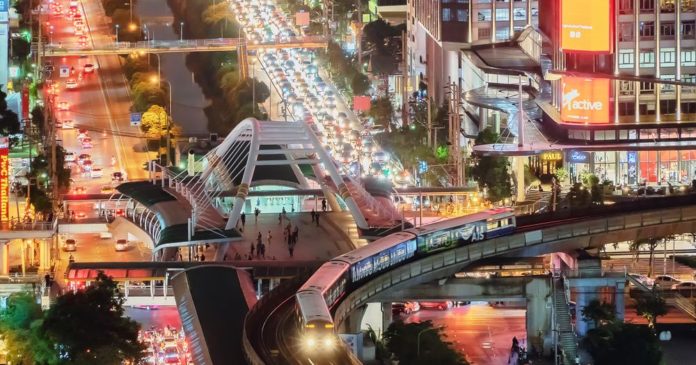
You know the script of 1984. You’re constantly being watched over so that the city officials can better serve you. Or at least that’s what those promising the “brave new world” of smart cities preach.
It is, however, important to add that all this footage will undoubtedly lead to infringing on your/our privacy. Perhaps that is part of the idea that some of us change our behavior when we know that we are constantly being watched.
And cameras are just one piece of the puzzle — there are also many sensors, Internet of Things (IoT) devices, biometric surveillance and, finally, artificial intelligence to make sense of all that data. What “sense” you may ask? Well, it all depends on the country you’re in.
If you’re in Europe, you may have seen the addition of new services that truly make life slightly easier for residents and also, we read, for emergency responders (who need all the tools they can get to better protect the people and property).
On the other hand, we have two very different examples that seem to be taken right from George Orwell’s famous novel.
Example #1: Saudi Arabia’s NEOM
Dubbed “the world’s first cognitive city,” the NEOM project was launched in 2017 by Saudi Crown Prince Mohammed bin Salman as part of Saudi Arabia’s Vision 2030. It is projected as a megacity the size of Belgium, stretching over 26,500 kilometers in the northwest of the country. The cost of building is estimated at $500 billion, with its first phase scheduled for completion by 2025.
The promotional videos imagine the city with flying taxis, cloud seeding to make rain in the desert, robot maids, dinosaur robots, glow-in-the-dark sand, a giant artificial moon, and state-of-the-art medical facilities.
Adding on top of that is a massive amount of data the city officials will be collecting on all of its constituents to make “better decisions” and “run things smoothly.” To that end, every citizen will have its own unique ID that will help him/her access the city services, manage his/her health and interact with all kinds of devices.
Some freedoms will exist, but the extent of those would be questionable in the middle of Europe let alone in Saudi Arabia. So if you behave, you’re good to go, otherwise… We don’t even want to imagine.
Example #2: Egypt’s New Administrative Capital
In 2015, Egyptian President Abdel Fattah Al-Sisi embarked on a smart city project of its own. Located in the north of Cairo, the New Administrative Capital aims to house Egypt’s ministries, administrative and financial institutions, and foreign embassies. Spread across 700 km2, it is projected to harbor a population of 6.5 million people, offering a “smart” digital infrastructure and experience.
Once completed, it will let residents access all kinds of city services with their phones, while a network of a few thousand cameras will make sure that no crime comes unpunished. Add a bunch of sensors, the ever present Wi-Fi, and of course some artificial intelligence to the mix — and you get a true dystopian society where everything looks nice and shiny whereas the reality could be very different.
Like that’s the case with the project in Saudi Arabia, here too the data governance is a non-issue. And that’s the problem.
Problems with smart cities
We’re all for city services getting better, but we are also very serious about privacy. Here are some of the issues with have with smart cities:
Data governance
As mentioned above, data governance should be an important issue in every smart city project. We’re talking about people’s lives and no one should have the power to peak into our whereabouts without a court order. That’s how things work in the real world and at one point it seems that we’ve all forgotten that. Already companies like Google and Facebook know a lot about us, and now even local (and national) governments want to join this party. We don’t like it. At all.
Free will may not be that free
Time and time again it has been proven that people change their behavior when they know someone is watching. That was the “secret ingredient” of all dictators in the 20th century, with their network of agents promoting the idea that “Big brother is watching you.” Modern technologies make this task much easier and when they are implemented on a city-wide scale, we get the modern dystopia. So let’s not call it just “smart city” but “smart dystopian city.”
Cybersecurity
With all the data they would be housing, smart cities will quickly emerge as lucrative targets for hackers all around the world. We have already seen this happening with some municipalities, and when hackers know there’s a ton of data – they would be that much more eager to break into the city servers. The problem here is that these kinds of cities will have even more sensitive data as they could potentially have information about all the people that live in the area. That is scary. And trust me – smart cities will be hacked. Simply put, hackers have a lot to gain from it.
What can we do?
It is important to again emphasize that we don’t have anything against smart cities. They are coming with some implementations already bringing benefits both to the general public and city services.
The problem is privacy. In countries where that is possible, NGOs should organize and require that proper data governance measures be implemented and whenever possible, to anonymize the data collected. Also, to use encryption across the board so that even if the city is hacked no personal information is being exposed.
And that’s just a start. We’re still in the early days of smart cities so we have to get ready for what comes next. A VPN could be one of the tools to help you regain your digital freedom, so you better get yourself one today. You know where to go for that, right? 😉
